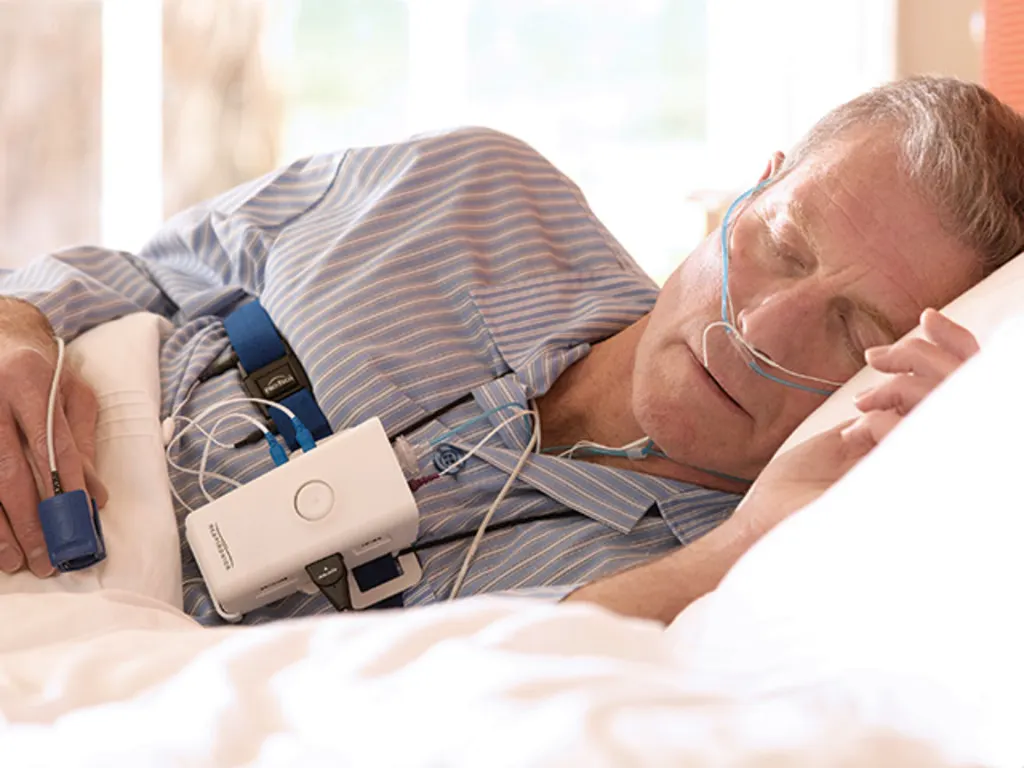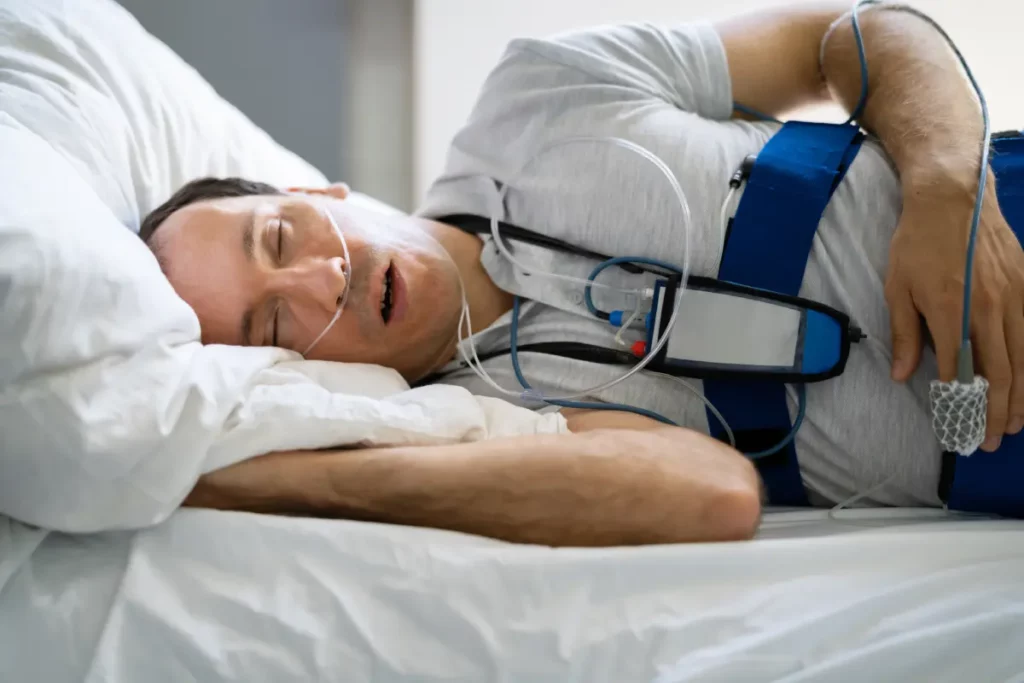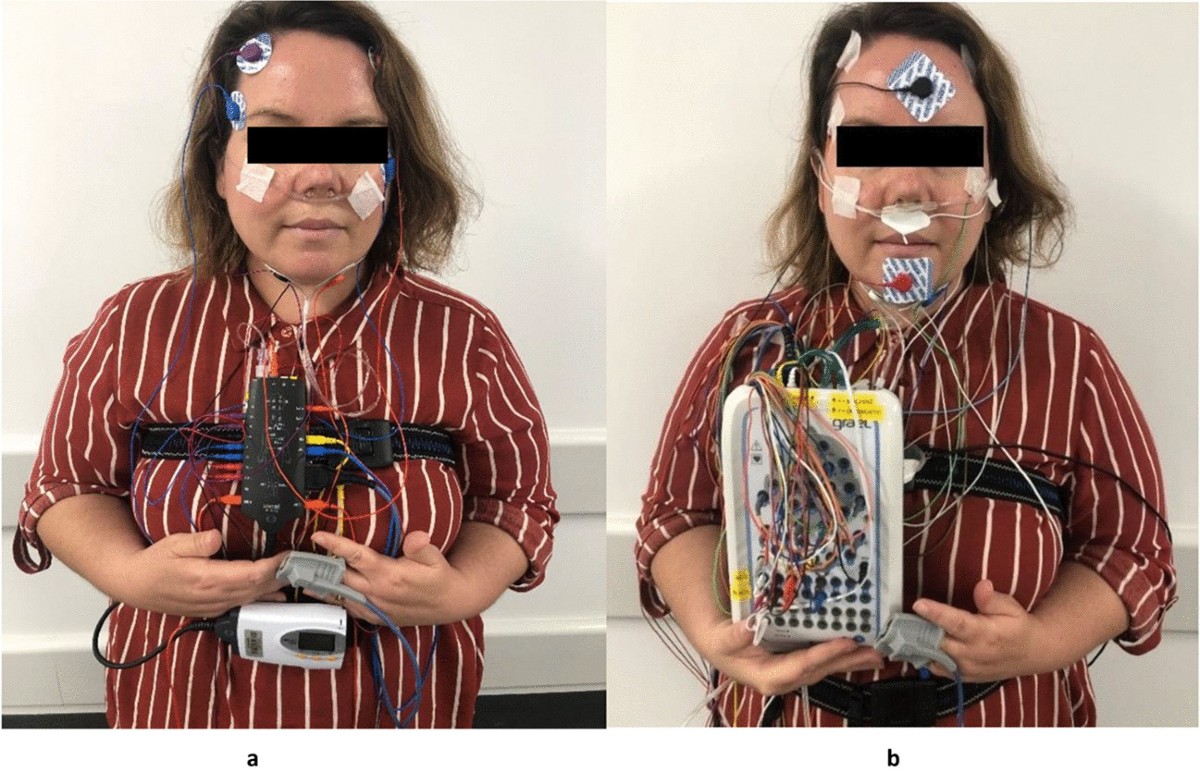Sleep studies are important diagnostic tools used to identify and treat sleep disorders in Perth. These thorough assessments track various physiological factors during sleep, offering valuable insights into sleep patterns and potential disorders.
The landscape of sleep studies in Perth has changed significantly, now offering two different testing methods:
- Lab-Based Studies: Conducted in specialised sleep clinics under direct medical supervision
- Home-Based Studies: Performed in the comfort of one’s own bedroom using portable monitoring devices
The decision between these options has a significant impact on diagnosis accuracy, patient comfort, and treatment outcomes. Each testing method has its own advantages and considerations that must align with individual patient needs and circumstances.

This comprehensive guide explores:
- Detailed analysis of lab-based sleep studies and their monitoring capabilities
- Step-by-step breakdown of home-based sleep testing procedures
- Direct comparison of both testing methods across key factors
- Leading sleep study providers in Perth
- Essential considerations for selecting the most suitable testing option
Understanding these testing alternatives empowers patients to make informed decisions about their sleep health assessment. The right choice depends on factors such as medical history, suspected sleep disorders, and personal preferences regarding testing environments.
Understanding Lab-Based Sleep Studies
Lab-based sleep studies, also known as polysomnography, are the most reliable way to diagnose sleep disorders. These in-depth assessments are conducted overnight in specialised sleep clinics, where trained technicians oversee the process.
Perth residents seeking sleep study Perth services have access to several established healthcare providers specialising in sleep diagnostics and treatment. These providers offer varying levels of expertise, technology, and service options to address different sleep-related concerns.
The Process
A typical lab-based sleep study involves:
- Arrival at the sleep clinic during evening hours
- Initial consultation with sleep technicians
- Sensor attachment and calibration
- Overnight monitoring in a private room
- Morning departure with preliminary findings
Advanced Monitoring Equipment
Lab-based studies use advanced sensors to track various bodily functions:
- Brain activity – EEG electrodes measure brain wave patterns
- Eye movements – EOG sensors detect REM sleep phases
- Muscle activity – EMG electrodes monitor muscle tension
- Heart rhythm – ECG leads record cardiac function
- Breathing patterns – Chest bands measure respiratory effort
- Blood oxygen – Pulse oximeter tracks oxygen saturation
- Body position – Position sensors note sleep posture changes
Data Collection and Analysis
Throughout the night, sleep technicians gather data using specialised software. This information creates detailed maps of your sleep patterns, showing:
Read more at: How to Get a Bulk-Billed Sleep Study in Perth
- Sleep stages and cycles
- Respiratory events
- Limb movements
- Cardiac rhythms
- Oxygen levels
- Sleep positions

Benefits of Lab-Based Studies
The controlled environment of sleep laboratories offers distinct advantages:
- Comprehensive monitoring of multiple parameters
- Real-time observation by trained professionals
- Immediate intervention if medical issues arise
- High-quality data collection
- Detailed analysis of complex sleep disorders
- Ability to diagnose rare sleep conditions
- Maximum diagnostic accuracy
Lab-based sleep studies provide the most thorough assessment of sleep disorders, particularly beneficial for patients with complex conditions or multiple health concerns requiring close monitoring. Read more about disorders on https://www.genome.gov/For-Patients-and-Families/Genetic-Disorders
Exploring Home-Based Sleep Studies
Home-based sleep studies offer a practical alternative to traditional laboratory testing, allowing patients to undergo sleep assessments in their natural sleeping environment. These studies employ sophisticated yet user-friendly monitoring devices to collect essential sleep data.
Step-by-Step Process
1. Initial Setup
- Patient receives a portable monitoring device
- Healthcare provider demonstrates proper equipment usage
- Written instructions and support contacts provided
2. Equipment Placement
- Attach nasal cannula for breathing measurement
- Position chest and abdomen belts
- Connect finger probe for oxygen monitoring
- Place position sensor on chest
3. Data Collection
- Device automatically records sleep patterns
- Monitoring continues throughout the night
- Data stored securely within the device
Common Monitoring Devices
- Actigraphy Watches: Track movement patterns and sleep-wake cycles
- Nasal Airflow Monitors: Measure breathing patterns and potential apnea events
- Pulse Oximeters: Record blood oxygen levels and heart rate
- Position Sensors: Document sleeping positions
Reliability and Validity
Research indicates home sleep studies demonstrate strong diagnostic accuracy for specific sleep disorders, particularly sleep apnoea. While lab-based studies capture more parameters, home studies effectively identify:
- Breathing disruptions
- Oxygen desaturation events
- Sleep position changes
- Heart rate variations
Key Advantages
Home sleep studies offer several advantages over traditional lab-based assessments:
- Natural sleep environment
- Reduced anxiety levels
- Flexible scheduling options
- Cost-effective solution
- Minimal disruption to daily routines
- Suitable for mobility-restricted patients
- Ideal for preliminary screening
- Quick results turnaround
Home sleep studies prove particularly beneficial for patients requiring multiple nights of monitoring or those who experience anxiety in clinical settings. The familiar environment often results in more representative sleep patterns, providing valuable diagnostic insights for healthcare providers. Click here to find more about anxiety.
Comparing Home and Lab-Based Testing Options
The scope of monitoring capabilities marks a significant distinction between home and lab-based sleep studies. Lab-based studies capture extensive physiological data through advanced monitoring equipment, including:
- Brain wave activity (EEG)
- Eye movements (EOG)
- Muscle activity (EMG)
- Heart rhythm (ECG)
- Blood oxygen levels
- Respiratory effort
- Body position
Home-based studies focus on essential parameters:
- Airflow
- Breathing effort
- Heart rate
- Blood oxygen saturation
- Body position
Patient profiles play a crucial role in determining the most appropriate testing option. Lab-based studies suit individuals with:
- Complex sleep disorders
- Multiple health conditions
- Severe sleep apnea symptoms
- Neurological conditions
- Cardiac issues
Home-based testing proves beneficial for patients with:
- Suspected mild to moderate sleep apnea
- Limited mobility
- Anxiety about medical settings
- Regular sleep patterns
- No significant health complications
Cost considerations vary between the two options. Lab-based studies typically involve:
- Higher out-of-pocket expenses
- Facility fees
- Technical staff costs
- Equipment usage charges
Home-based studies offer cost advantages:
- Lower overall expenses
- Reduced technical fees
- No facility charges
- Medicare rebates available
- Private health insurance coverage options
The choice between home and lab-based testing depends on individual circumstances, medical requirements, and financial considerations. Medicare covers diagnostic tests meeting specific guidelines, while private health insurers may provide coverage under particular packages.
Providers of Sleep Studies in Perth: A Comprehensive Guide
Air Liquide Healthcare – Sleep Solutions
Air Liquide Healthcare stands as Australia’s largest facilitator of home sleep apnea studies, bringing extensive experience and technological advancement to Perth’s sleep healthcare sector. The organisation delivers comprehensive sleep diagnostic services through multiple established sleep brands, including SNORE Australia, Healthy Sleep Solutions, and Sleep Disorder Australia (SDCA).
Key Services:
- Home-based sleep apnea studies using non-invasive recording methods
- CPAP therapy initiation and customised titration programs
- Ongoing therapy guidance and patient support
- Regular follow-up assessments
The provider’s patient-centric approach incorporates:
- Integrated Care Model
- Diagnosis and treatment validated by qualified Sleep Physicians
- Collaboration with leading CPAP equipment manufacturers
- Medicare-compliant diagnostic testing
- Private health insurance coverage options for CPAP therapy
Air Liquide Healthcare’s end-to-end solution encompasses the complete patient journey from initial diagnosis through to long-term management of Obstructive Sleep Apnea. Their diagnostic process utilises advanced technology for accurate home-based sleep monitoring, allowing patients to undergo testing in familiar surroundings while maintaining clinical precision.
For those seeking similar services outside Perth, Sleep Study Brisbane, Sleep Study Melbourne, or Sleep Study Sydney are also available options. The provider’s extensive network across Perth ensures accessibility to sleep study services, supported by teams of healthcare professionals trained in sleep medicine and patient care. This combination of technological capability and clinical expertise positions Air Liquide Healthcare as a significant contributor to sleep healthcare delivery in the Perth region.
2. Sleep WA
Sleep WA is a leading sleep clinic in Perth, known for its expertise in diagnosing and treating sleep disorders. The clinic has built a strong reputation by taking a thorough approach to assessing sleep health and consistently providing accurate diagnostic results.
Advanced Home Sleep Apnea Screening Technology
At the core of Sleep WA’s diagnostic capabilities is their advanced Level 3 portable home sleep apnea screening technology. These sophisticated devices capture essential sleep metrics, including:
- Airflow measurements
- Blood oxygen levels
- Heart rate variations
- Breathing patterns
- Body position changes
The Level 3 screeners enable patients to undergo thorough sleep assessments without leaving their homes. This technology records detailed data throughout the night, providing sleep specialists with vital information for accurate diagnosis of conditions such as sleep apnea.
User-Friendly Portable Screening Devices
Sleep WA’s portable screening devices feature user-friendly designs, allowing patients to set up the equipment independently. The clinic’s technical staff provide detailed instructions and support to ensure proper device placement and operation during the study period.
Availability of Sleep Studies in Other Cities
For those outside of Perth, similar sleep studies are available in Hobart, while residents of Adelaide can also benefit from sleep studies offered by Sleep Solutions Australia. Additionally, individuals in Canberra looking for effective sleep disorder treatments can explore the options provided by Sleep Solutions Australia.
3. Woolcock Clinic
The Woolcock Clinic is a leading provider of sleep study services in Perth, known for its extensive research and clinical expertise. With decades of experience in sleep medicine, this specialist facility offers both diagnostic and therapeutic solutions for various sleep disorders.
Home-Based Testing with a Patient-Centric Approach
The clinic’s approach to home-based testing reflects its commitment to patient-centric care. Their portable sleep monitoring devices incorporate advanced technology to capture essential sleep parameters, including:
- Breathing patterns and oxygen levels
- Heart rate variability
- Body position and movement
- Sleep architecture analysis
High Clinical Standards and Patient Comfort
The clinic’s diagnostic protocols maintain high clinical standards while prioritising patient comfort. Each home sleep study kit comes with detailed instructions and remote support, ensuring accurate data collection in familiar surroundings.
Research-Backed Methodologies for Detailed Insights
A distinctive feature of the Woolcock Clinic’s service is its integration of research-backed methodologies with practical applications. The clinic’s sleep specialists analyse test results using sophisticated software, providing detailed insights into sleep patterns and potential disorders.
4. Sleep Solutions Australia
Sleep Solutions Australia is a leading provider of home-based sleep diagnostic services in Perth. They specialise in offering personalised sleep study solutions using advanced diagnostic equipment designed for home use.
Their diagnostic approach includes:
- Advanced Monitoring Systems: Using portable devices that track important sleep parameters such as breathing patterns, heart rate, and oxygen levels
- Real-Time Data Collection: Advanced technology that allows continuous recording throughout the night
- User-Friendly Equipment: Easy setup procedures with clear instructions for accurate data collection
The provider’s home diagnostic tests use multiple sensors to gather comprehensive sleep data:
- Respiratory effort measurements
- Blood oxygen level monitoring
- Body position tracking
- Heart rate variability analysis
Sleep Solutions Australia’s testing equipment meets strict medical standards while ensuring patient comfort. Their diagnostic services follow rigorous quality control measures to guarantee reliable results comparable to laboratory-based studies.
The organisation maintains direct communication channels with referring physicians, making it easier to coordinate patient care and treatment planning based on sleep study findings.
Making an Informed Choice: Home vs Lab-Based Testing Options for Your Sleep Study Needs in Perth
The selection between home and lab-based sleep studies represents a significant decision in the journey towards better sleep health. Each testing method brings distinct advantages to the table:
Lab-Based Studies:
- Professional supervision throughout the night
- Comprehensive monitoring of multiple sleep parameters
- Ideal for complex sleep disorders
- High-quality diagnostic data
Home-Based Studies:
- Natural sleep environment
- Cost-effective solution
- Minimal disruption to daily routine
- Comfortable and convenient testing experience
The choice between these options depends on individual circumstances, including:
- Severity of sleep symptoms
- Presence of other medical conditions
- Personal comfort preferences
- Financial considerations
- Insurance coverage
A consultation with qualified healthcare professionals remains essential for determining the most appropriate testing method. These specialists can evaluate specific sleep concerns, medical history, and lifestyle factors to recommend the optimal approach for accurate diagnosis.
The timely diagnosis and management of sleep disorders through either home or lab-based testing can significantly improve quality of life. Perth residents have access to various reputable providers, each offering specialised expertise in sleep diagnostics and treatment solutions.

